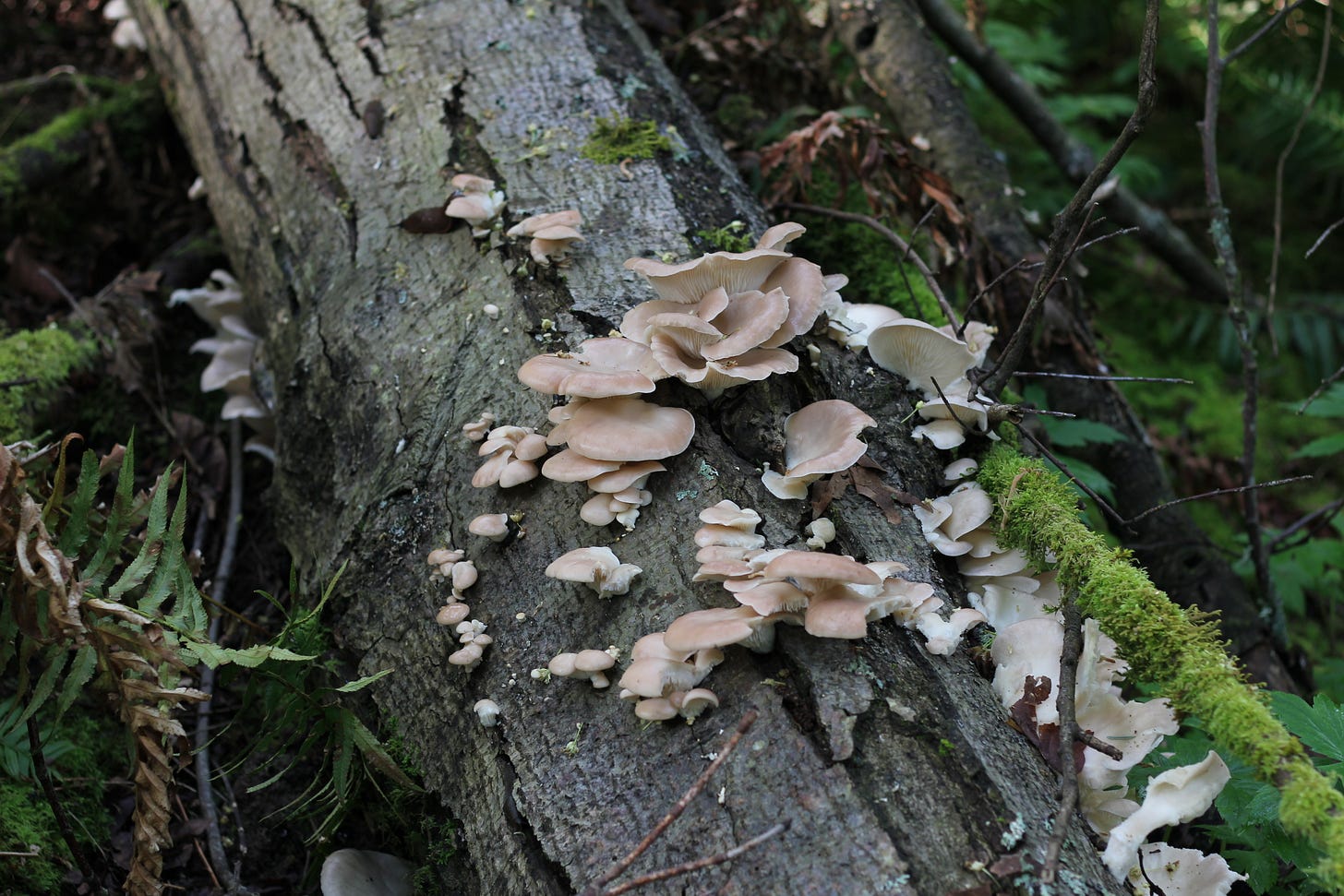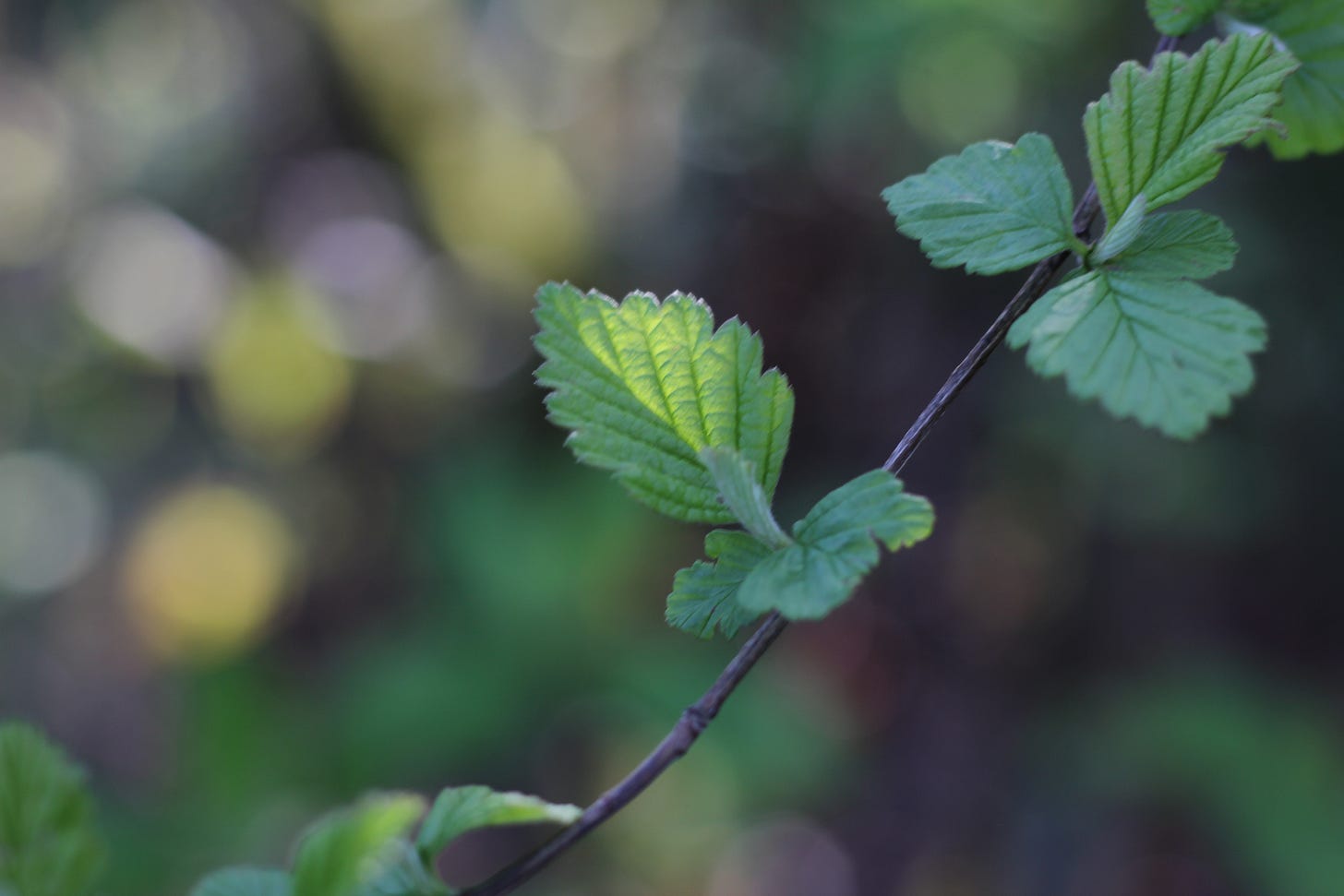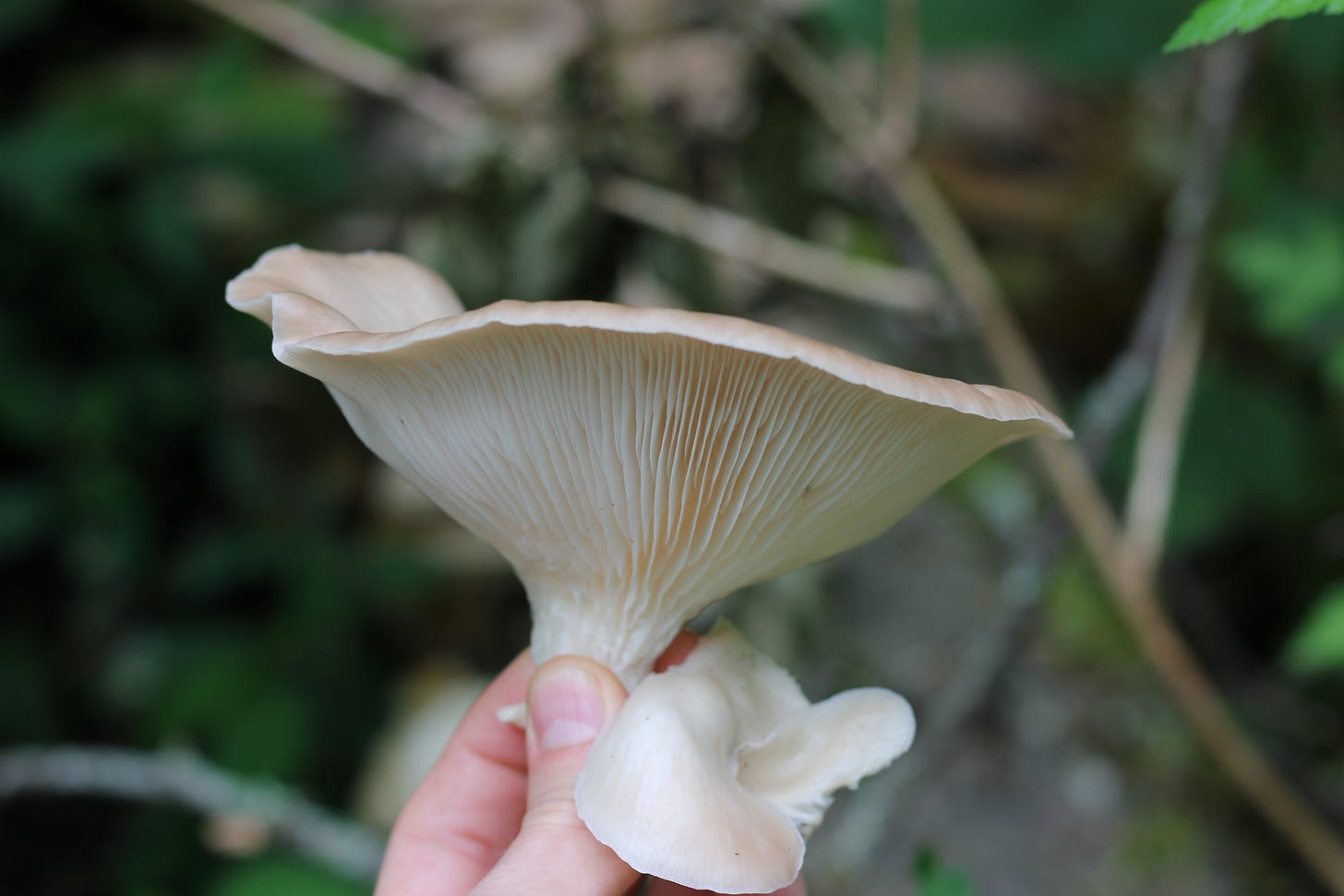Hi there.
The way I grew up, nature was just something to look at. It was always out the car window, over the iron gates behind concrete pools and green grass lawns, or planted off the sidewalks in pyramidal Ponderosa pines and anorexic palm trees. The rolling hills behind my house were forbidden to tread for lack of trails and fear of Poison oak underbrush.
My interactions with plants were always indirect, undistinguished by any shared knowledge or language, except maybe from a ranger on the occasional national park vacation. Even the lessons imparted there went unintegrated into daily life, and so were soon forgotten.
It wasn’t until I relocated to the Pacific Northwest that my eyes and voice got turned on to notice and recognize more of the nature around me. Like many a half-assed psychonaut, I started mushroom hunting with one very particular mushroom in mind. On my first time looking, however, around an urban lake in North Seattle, I found so much more than I bargained for — a whole rainbow-colored world of fungi sprouting from the muddy reeds and rotted wood every few steps.
At first, I took samples and tried to identify every mushroom I found, which becomes very time-consuming. Gradually I got to know the commonest edible species I could find, like the pale oysters that bloomed from cracks in the bark of dead red alders in the wooded park not five minutes away from where I lived.
To know the mushrooms, I learned the trees. Soon I would be disappointed to return from a walk or hike emptyhanded, without something tasty to present to my partner and add to the next meal. When the mushrooms weren’t fruiting or the worms beat me to ‘em, the edible plants provided a reliable consolation prize.
Now I was doing much more than look at nature. My sticky fingers fondled their way through the woods, delighting at the textures of fuzzy thimbleberry leaves and drooping Ocean spray flower clouds as they unfolded with the seasons. A lack of gloves couldn’t even keep me from pinching off the stinging nettles that blanketed the park’s south-facing hillside come early spring.
Like with the mushrooms, I rushed in with all the excitement sublimated from my indoorsy childhood, then learned what I was doing as I went along, often through chance encounters. A man with a felt newsboy cap and petite features narrowed to the point of his nose recommended I make nettle lasagna, nettle pesto, nettle risotto. The oysters contributed to make the risotto a class in our kitchen. A gentle-vocied woman with a spot on a log where she’d watched a single nettle grow from sprout to seed gave my first lesson in sustainable harvesting for that particular species.
“If you cut it above the node, it grows back double.” She drew my attention to a pre-harvested nettle with two stalks splitting from the cut above one of the top nodes.
Node (n.): the point on a plant’s stem where the leaves connect.
The language was filling in, along with my other senses. The goal of seeing sights and photographing views on hikes was satisfying, but never compelling enough to make a habit of it for me. Smelling, touching, and tasting the scenery along the way was a different story. Taste especially. It was the most intimate and pleasurable sense nature could offer by far, the consummation the other senses sought. Then the forest was not just scenery anymore — it was nourishment.
That nourishment came in other forms as well, ones I couldn’t have foreseen from my field guides. Why, for example, did coming back to the forest start to feel like coming home? Like I knew these temperate woods better than I did, better than my conscious life experience of sunny southern California’s paved grasslands could rationally explain? I wondered how familiar this environment, or maybe just the extent of my interaction with it, would feel to my ancestors from the forests of northern and eastern Europe. Maybe we were more connected than I realized.
Those trails gave me essays. The mushrooms made me a poet. I sang the plants’ Latin names to them as I passed. The stumps and log benches held my revelations, sunlit maple leaves dancing in the world-renewing pause between pivotal passages of Emerson, Baldwin, Alan Watts, and Audre Lorde. When I wondered, like David Byrne, how did I get here?, the seasonal evolutions of the forest provided understanding.
After a few years of woods wandering and professional procrastination, I felt like an expert on the woods relative to my upbringing. When I paid for a permaculture course to take my knowledge of the land to the next level, however, I learned how little I truly knew compared to the indigenous people who had intimately tended it since time immemorial, until settler colonialism devastated their populations and erased their languages, making room for the arrival of my ancestors.
It was the kind of loss you can’t make up for overnight, or even in one lifetime. My efforts to learn more could seem so futile in the face of it. Grief came home to the woods in a new way, and I questioned my ability or worthiness to forage from them without guilt, given my moral gray areas in this tragic and unresolved history.
Yet through the veils of despair, I still found joy and beauty in the plants and mushrooms that had called me this far out from the way I grew up in the first place. I found purpose in telling others what I knew, and heard their feedback that I seemed a natural teacher. Perhaps because one of the greatest lessons I’d learned in all my foraging was that Nature herself is the one true teacher, and all of us — humans, trees, mushrooms, and otherwise — are merely vessels for her knowledge.
To continue learning and teaching, it’s been essential to wade through the grief and guilt of what our systems have done to the Earth, along with many of her peoples and languages. Otherwise I’d be blinding myself to past and future, and remaining mired in the cultural systems of alienation from nature I’ve been called to help penetrate and dismantle. My ancestors weren’t indigenous to this bioregion I’ve ended up in, but they were indigenous to the Earth, somewhere, before history and culture intervened to take them elsewhere. I don’t have to be indigenous to this land to do so and be a part of remembering, even in new terms, what’s been forgotten.
As each season unfolds in ways we can only observe in hindsight through our dawning understanding of time, so the larger seasons of history are still unfolding with all of our short lives caught in the crosshairs. For all humanity’s attempts to tame the wild, we are still firmly within it. Even the most heavily reinforced and orderly civilizations crumble and make space for a new way’s renewal, like tasty mushrooms myceliating through a rotting corpse.
That is the kind of intimacy and interpenetration nature represents, which can seem both disgustingly repulsive and enchantingly beautiful to our sensibilities by turns. By turning away from it, however, we turn away from life itself. By heeding our appetites and learning the ethical ways to perceive them, we embrace it.
Now, I present you with one of the poems this journey has given me. Enjoy.
The Wild Harvest
From palm trees perched like fangs along a mouthy shore To rainforests that crack pavement before it's put down, I had to find my way to you Because someone somewhere along the lineage lost theirs. Spoiled in captivity, trained to oblivion, I harvest the wild, guided by senses That once belonged to an assembly line Churning out dreams of you That get glossier every print cycle. Seasons' rejuvenation, the stranger getting strangest, Cause some never ditch the treadmill for a trail. From doomed luxury to everlasting hardship, I gained in knowledge what I’ve lost in convenience From encounters with the ribcaged worms eating where we shit Wriggling neurons whisper the secrets of death. The north wind cuts through all my guardian’s gifted garments Peeling them away from a stale sweat suffused Inhale a new brand that can't be bottled. I don't know what was calling to me or how But we're here together now. I don't know how much was free will and how much fate But I'm still willing to wait. Once upon a life, I was on the inside looking out But you're inside me now And our smell comes wafting out.










What a deep preface!! How you’ve evolved :)
Go share your passion and flourish;)!